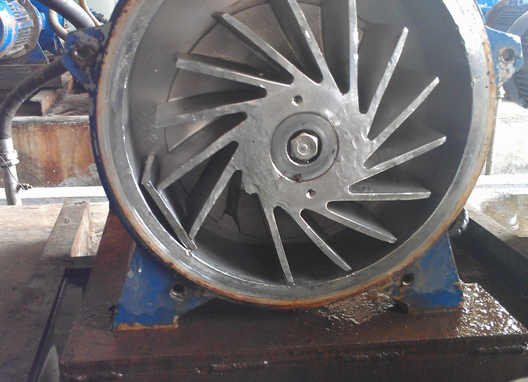Causes and avoidance methods of water pump impeller falling
The following aspects can be considered to determine the causes and avoidance methods of the impeller falling off:
1. Determine the causes of the impeller falling off
1. Unreasonable design process
Improper design of the connection between the impeller and the pump shaft, such as only simple tight fit and nut fixation, lack of additional anti-falling device, may cause the impeller to fall off due to vibration or uneven force during operation.
2. Installation problem
During the installation process, the impeller and the pump shaft are not firmly fastened, such as the nut is not tightened or the locking device fails, which may cause the impeller to loosen and fall off during operation.
The installation environment is limited, such as the small space that makes it impossible to fully tighten the nut, which may also be a cause.

3. Operation problem
The motor circuit is connected in reverse or the phase sequence is wrong, causing the pump to reverse. When reversing, the force on the impeller is opposite to the original design direction, which may cause the fasteners to loosen and then cause it to fall off.
When the pump is stopped, the outlet valve is not closed or the check valve fails, and the liquid backwash in the vertical pipeline causes the impeller to reverse, which may also cause the impeller to loosen and fall off.
4. Unit vibration
Vibration caused by imbalance, foundation settlement and other reasons during the operation of the unit may cause the fasteners to loosen, thereby affecting the stability of the impeller.
5. Medium factors
In the case of high solid content, easy crystallization or easy freezing at low temperature in the medium, if the pump is not flushed and drained after stopping, the impeller may be blocked or frozen, and the main shaft may break and the impeller may fall off due to excessive torque at the next start.
6. Equipment aging
The impeller, main shaft and other parts are worn and corroded due to long-term use, and the strength is reduced, which may cause breakage or falling off.
2. Methods to prevent the impeller from falling off
1. Optimize design and process
Use a more reasonable way to connect the impeller and the pump shaft, and add anti-falling devices such as locking bolts and locking washers to improve the stability of the impeller.
2. Strict installation and inspection
During the installation process, ensure that the impeller and the pump shaft are firmly fastened, and all fasteners must meet the specified torque requirements.
After installation, conduct a comprehensive inspection to ensure that there is no looseness or abnormality.
3. Standardize operation
Ensure that the motor circuit is connected correctly to avoid reverse rotation.
Close the outlet valve before stopping the pump to ensure that the check valve works normally to prevent liquid backwashing.
4. Strengthen maintenance
Perform regular maintenance on the unit, check the wear and corrosion of the impeller, main shaft and other parts, and replace damaged parts in time.
Clean up impurities and crystals in the medium to prevent clogging of the impeller.
5. Add protective measures
Install a check valve or a non-return valve on the pump outlet pipeline to prevent liquid backwashing.
In cold areas or low temperature environments, the pump cavity should be flushed and the accumulated water should be drained in time after stopping the pump to prevent freezing.
6. Monitoring and early warning
Install monitoring equipment such as vibration monitoring devices and temperature sensors to monitor the operating status and temperature changes of the unit in real time.
Set the early warning value, and take timely measures to deal with it when the monitoring data exceeds the early warning value.




